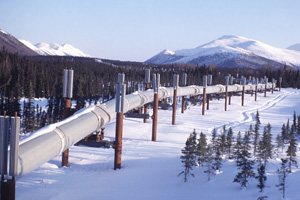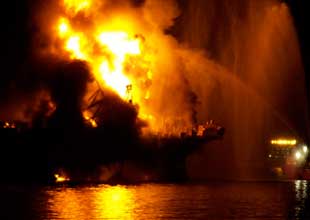In the months since the Deepwater Horizon blew up and unleashed 4.9 million barrels into the Gulf of Mexico, the whereabouts of the oil has been a major subject of research and debate. Some reports suggests the oil has accumulated in large, undersea plumes. Others have found it accumulating on the Gulf floor. But a report compiled by the Congressional Research Service concludes that the actual fate of the oil that remained in the Gulf after clean-up efforts is anyone’s guess.
The Federation of American Scientists posted the report on its website on Monday, though it’s dated December 16 (h/t to Andrew Restuccia for flagging it over at E2 Wire). “Deepwater Horizon Oil Spill: The Fate of the Oil” surveys a variety of studies released since the well was finally capped in late July. The author notes that while a “substantial portion” of the oil has been removed, “a greater portion remained, in some form.”
As the report notes, even if one assumes that about half of the oil has been removed from the Gulf, as the government does, that means the other half—more than 2 million barrels—remains in the Gulf.
The report concludes:
It is debatable whether the fate of the remaining oil will ever be established conclusively. Multiple challenges hinder this objective: the complexity of the Gulf system; resources required to collect data; and varied interpretations over the results and observations. Moreover, as time progresses, determining the fate of the oil will likely become more difficult. Regardless, the question of oil fate will likely be addressed through an incremental process. Researchers are continuing to study various components of the Gulf, specifically damages to natural resources. Some of these efforts may provide clues to the oil’s fate.
There was quite a bit of controversy when the Obama adminstration released its report on the fate of the oil in early August, because the was no supporting data to accompany the figures at the time and because administration officials falsely claimed that the oil budget had been peer reviewed. The National Oil Spill Commission report blasted the administration’s handling of that report. But the administration later issued a peer-reviewed version of that oil budget, concluding that its earlier estimates were in fact correct. The CRS report accepts those figures as accurate while highlighting that uncertainties remain about how precise the estimates are. Moreover, the August estimate is now five months old and not necessarily relevant to where the oil is today.
But the fate of all that oil is still a crucial question. Its lasting impact will (or at least, should) affect decisions about the damages assessed for the spill and policy choices going forward. And, as the report notes, it also affects perceptions about Gulf industries like fishing and tourism.













